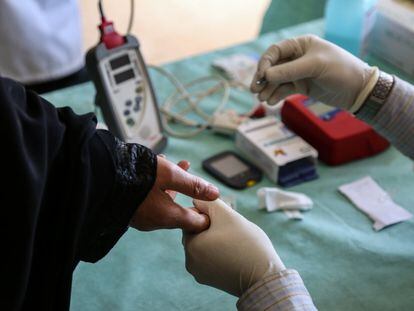In 2018, Nam Han Cho, then president of the International Diabetes Federation (IDF), referred to the epidemic of this disease as "the third world war", comparing the million and a half annual deaths it causes with those fallen in a war. The hyperbole shows the desperation of some experts in the face of the relentless advance of the disease and the difficulty in raising awareness in society of its magnitude. Today, the medical journal The Lancet publishes a series of articles in which it again draws attention to the threat of diabetes, which, they argue, is not faced with the right tools.
According to estimates published in the journal, in 2050 there will be around 1.300 billion people living with diabetes worldwide, an increase that more than doubles the 529 million affected today. 90% will be people with type 2 diabetes, a disease associated with obesity, diet, alcohol or tobacco consumption and lack of physical activity, and which is closely related to poverty. In the United States, diabetes is 1.5 times more frequent among minorities such as blacks or Native Americans, a problem that the authors of the Lancet articles attribute, among other things, to structural racism.
In an editorial also published today, the journal warns against the erroneous approach many take to diabetes. Despite the success of new drugs against the disease, which also help reduce obesity, "the solution to unhealthy and unjust societies is not more pills, but reevaluating and reimagining our lives to provide opportunities that address racism and justice and act on the social factors of the disease," they say, quoting doctor Rupa Marya and economist Raj Patel. The market for diabetes drugs will grow, according to some estimates, to $100 billion in the next decade and could reach 000 times by 10. However, as with many other diseases, which are more treatable with healthy habits applied in time than with drugs when it is almost too late, the effort to anticipate diabetes does not receive the necessary attention. In 2045, European Union countries spent, on average, 2018.2% of their health spending on prevention.
Read moreDiabetes: the epidemic that can crush us because it doesn't excite
Experts have long stressed the need to include poverty as a fundamental factor to combat to improve health. The Lancet Wake-Up Calls estimates that by 2045, up to three out of four adults with diabetes worldwide will live in low- or middle-income countries. Today, only about 10% of people suffering from the disease in these places receive adequate treatment. The growing burden of diabetes, however, is not only seen in those countries with fewer resources. In the United States, the prevalence of the disease has almost doubled among young people, increasingly exposed to all kinds of foods that increase the risk of obesity and a more sedentary life. As with all diseases in all parts of the world, those who suffer most from the rise in the world's leading power are the poor, who are, most often, black or Native American.
With current trends, no country is expected to reduce its percentages of diabetics and there will be regions such as North Africa or the Middle East where rates will reach 20%. "Diabetes remains one of the greatest public health threats of our time and will grow rapidly over the next three decades in all countries, regardless of age or sex, posing a major challenge to health systems around the world," said Shivani Agarwal, Albert Einstein School of Medicine. in New York (USA). Agarwal, who has led this series of articles, states that "focusing on understanding inequality in diabetes is vital to achieving the UN Sustainable Development Goals, which aim to reduce noncommunicable diseases [such as cancer or diabetes] by 30% in less than seven years and reduce the growing negative effects on the health of marginalized populations and on the strength of national economies in the decades to come." Adds.
The series cites success stories in supporting communities with fewer resources, such as those in some countries in sub-Saharan Africa, where cooperation between governments, industry and patient associations has facilitated access to insulin and other health products with measurable reductions in the impact of the disease.
You can follow EL PAÍS Salud y Bienestar on Facebook, Twitter and Instagram.

